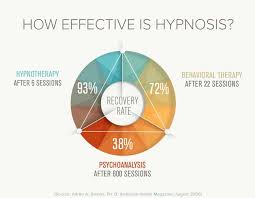Hypnosis Therapy: Unlocking the Power of the Subconscious Mind
In recent years, there has been a growing interest in alternative therapies that go beyond traditional methods of healing. One such therapy that has gained popularity is hypnosis therapy. Often misunderstood and surrounded by misconceptions, hypnosis therapy is a powerful tool that can help individuals overcome various challenges and tap into the potential of their subconscious mind.
Contrary to what many may believe, hypnosis is not a form of mind control or manipulation. It is a state of deep relaxation and focused attention where the individual becomes more open to suggestions. The therapist guides the person into this state, allowing access to the subconscious mind, which is responsible for our beliefs, emotions, and behaviors.
One of the primary applications of hypnosis therapy is in addressing limiting beliefs and behavioral patterns. These deeply ingrained thoughts and habits can hold us back from reaching our full potential. By accessing the subconscious mind during hypnosis sessions, therapists can help clients reframe negative beliefs and replace them with positive ones. This process allows individuals to break free from self-imposed limitations and embrace new possibilities.
Moreover, hypnosis therapy has shown promising results in managing stress and anxiety. Through deep relaxation techniques used during sessions, individuals can experience a profound sense of calmness and inner peace. This state helps reduce stress levels, promotes better sleep patterns, and improves overall well-being.
Another area where hypnotherapy has proven beneficial is in overcoming addictions. Whether it’s smoking, overeating, or substance abuse, addictions often stem from underlying emotional issues or unhealthy coping mechanisms. Hypnotherapy helps individuals address these root causes by delving into the subconscious mind and reprogramming negative thought patterns associated with addiction. By doing so, it empowers individuals to make positive changes in their lives.
Furthermore, hypnosis therapy has been utilized to manage chronic pain effectively. By tapping into the power of the subconscious mind during hypnosis sessions, individuals can learn to control and alleviate pain sensations. This approach offers a drug-free alternative for those seeking relief from persistent pain conditions.
It is important to note that hypnosis therapy is not a quick fix or a magic solution. It requires active participation and commitment from both the therapist and the client. The number of sessions required may vary depending on the individual’s needs and goals.
If you are considering hypnosis therapy, it is essential to seek out a qualified and experienced hypnotherapist who adheres to ethical practices. They will guide you through the process, ensuring your safety and well-being throughout the sessions.
In conclusion, hypnosis therapy is a valuable tool for personal growth, healing, and self-discovery. By accessing the subconscious mind, it allows individuals to address limiting beliefs, manage stress and anxiety, overcome addictions, and even alleviate chronic pain. If you are open to exploring alternative therapies that harness the power of your mind, hypnosis therapy may be worth considering as part of your holistic approach to well-being.
6 Essential Tips for Successful Hypnosis Therapy Sessions
- Make sure you find a qualified and experienced hypnotherapist who is licensed in your state.
- Before starting therapy, discuss the goals and expectations of the session with your therapist.
- Speak openly about any fears or anxieties you may have about hypnosis therapy and ask questions if needed.
- Relax your body and mind before each session to get the most out of it.
- Follow any suggestions given by your therapist during hypnosis sessions for best results.
- Give yourself time after each session to process what happened during the session and allow yourself to benefit from the experience fully
Make sure you find a qualified and experienced hypnotherapist who is licensed in your state.
The Importance of Choosing a Qualified and Licensed Hypnotherapist
When considering hypnosis therapy as a potential avenue for personal growth and healing, it is crucial to find a qualified and experienced hypnotherapist who is licensed in your state. This ensures that you receive safe, ethical, and effective treatment throughout your hypnosis sessions.
Hypnotherapy involves accessing the subconscious mind, which can be a deeply personal and vulnerable experience. Therefore, it is essential to work with a professional who has undergone proper training and certification in hypnosis therapy. A qualified hypnotherapist possesses the knowledge, skills, and expertise necessary to guide you through the process effectively.
Licensing requirements for hypnotherapists vary from state to state. By choosing a licensed hypnotherapist, you can have confidence that they have met specific standards set by regulatory bodies or professional associations. These requirements often include completing accredited training programs, obtaining supervised clinical experience, adhering to ethical guidelines, and participating in continuing education to stay updated with the latest practices.
Working with a licensed hypnotherapist also means that they are accountable for their actions. They are committed to maintaining professional standards and ensuring your safety and well-being during sessions. Licensed practitioners are more likely to follow strict confidentiality protocols and provide a secure environment where you can openly explore your thoughts, emotions, and experiences.
Additionally, licensed hypnotherapists often have access to ongoing supervision or consultation with other professionals in the field. This allows them to seek guidance when needed and ensures that they continuously enhance their skills through collaboration with peers.
When searching for a qualified hypnotherapist in your area, consider factors such as their credentials, years of experience, client testimonials or reviews, and any specializations they may have. You can also consult professional associations or licensing boards specific to your state for recommendations or verification of their credentials.
Remember that finding the right therapist is crucial for establishing a trusting therapeutic relationship. Take the time to schedule initial consultations or phone calls to discuss your goals, concerns, and expectations. This will help you gauge their approach, communication style, and whether you feel comfortable working with them.
In conclusion, choosing a qualified and licensed hypnotherapist is paramount when seeking hypnosis therapy. It ensures that you receive professional care from someone who has met the necessary training and ethical standards. By doing your due diligence in finding a reputable practitioner, you can embark on your hypnotherapy journey with confidence, knowing that you are in capable hands.
Before starting therapy, discuss the goals and expectations of the session with your therapist.
Before embarking on any therapeutic journey, it is crucial to have open and honest communication with your hypnosis therapist. Discussing your goals and expectations for the sessions sets the foundation for a successful and effective hypnosis therapy experience.
When you sit down with your therapist, take the time to clearly articulate what you hope to achieve through hypnosis therapy. Whether it’s overcoming a specific fear or phobia, managing stress and anxiety, improving self-confidence, or breaking free from unhealthy habits, sharing your goals will help the therapist tailor the sessions to meet your individual needs.
Additionally, discussing your expectations allows both you and the therapist to align on what can be realistically achieved through hypnosis therapy. While hypnotherapy can be highly effective in addressing various challenges, it is important to understand that results may vary from person to person. By having an open dialogue about what you hope to accomplish and understanding the limitations of hypnosis therapy, you can approach the sessions with realistic expectations.
During this discussion, don’t hesitate to ask questions about the process of hypnosis therapy itself. Understanding how it works, what techniques will be used, and how many sessions may be needed can provide clarity and alleviate any concerns or uncertainties you may have.
Remember that building trust and rapport with your therapist is essential for a successful therapeutic relationship. Be open about any fears or reservations you may have regarding hypnosis therapy so that they can address them appropriately.
By discussing your goals and expectations before starting hypnosis therapy, you set yourself up for a more focused and tailored experience. This proactive approach ensures that both you and your therapist are on the same page throughout the journey towards achieving positive change and personal growth.
Speak openly about any fears or anxieties you may have about hypnosis therapy and ask questions if needed.
Open Communication: Addressing Fears and Anxieties in Hypnosis Therapy
Embarking on a journey of hypnosis therapy can be both exciting and daunting. It’s natural to have fears or anxieties about the process, especially if it’s your first time exploring this alternative therapy. However, one of the most important tips to remember is to speak openly about any concerns you may have and ask questions if needed.
Hypnosis therapy involves entering a state of deep relaxation and heightened focus, where the subconscious mind becomes more receptive to suggestions. This unique experience may raise questions or uncertainties in your mind. It’s crucial to address these fears head-on by communicating openly with your hypnotherapist.
A skilled hypnotherapist understands the importance of building trust and creating a safe space for their clients. They will encourage open dialogue, allowing you to express any apprehensions you may have about the process. By sharing your fears and anxieties, you give your therapist valuable insights into your mindset, enabling them to tailor the sessions accordingly.
Remember that your hypnotherapist is there to guide you through the process and address any concerns you may have. Don’t hesitate to ask questions about how hypnosis works, what to expect during sessions, or any other aspect that is unclear to you. Understanding the process better can alleviate worries and help you feel more at ease.
Additionally, discussing any specific fears or anxieties related to hypnosis therapy can help your therapist adapt their approach accordingly. For example, if you are worried about losing control or being manipulated during the session, they can explain how hypnosis is a collaborative process where you maintain control over your thoughts and actions.
By openly addressing fears and anxieties, you create an environment of trust and collaboration with your hypnotherapist. This partnership allows for a more effective therapeutic experience as it ensures that sessions are tailored to meet your individual needs while also addressing any concerns that may arise.
In conclusion, speaking openly about any fears or anxieties you may have about hypnosis therapy is crucial for a successful and comfortable experience. Your hypnotherapist is there to support you and address any concerns you may have. By fostering open communication, you can gain a deeper understanding of the process, alleviate worries, and create a trusting therapeutic environment. So don’t hesitate to express your thoughts and ask questions – it’s an essential part of your journey towards self-discovery and personal growth through hypnosis therapy.
Relax your body and mind before each session to get the most out of it.
Relaxation: The Key to Unlocking the Benefits of Hypnosis Therapy
When it comes to hypnosis therapy, one crucial tip that can significantly enhance your experience and maximize the benefits is to relax your body and mind before each session. Relaxation sets the stage for a deeper and more receptive state, allowing you to fully tap into the power of your subconscious mind.
Before your hypnosis session, take some time to create a calm and peaceful environment. Find a quiet space where you won’t be disturbed, and eliminate any distractions that may disrupt your focus. Dim the lights, play soothing music if it helps you relax, and make sure you are comfortable.
Start by focusing on your breathing. Take slow, deep breaths in through your nose, allowing your abdomen to rise with each inhale. Then exhale slowly through your mouth, releasing any tension or stress with each breath. As you continue this rhythmic breathing pattern, feel yourself becoming more relaxed with each exhalation.
Next, perform a progressive muscle relaxation exercise. Begin by tensing and then relaxing each muscle group in your body one at a time. Start with your toes and work your way up through your legs, abdomen, arms, shoulders, neck, and finally to the muscles in your face. With each release of tension, feel a sense of deep relaxation washing over you.
As you enter the hypnosis session with a relaxed body and mind, you open yourself up to the transformative power of suggestion. The hypnotic state allows access to the subconscious mind where deep-seated beliefs and patterns reside. By being in a state of relaxation beforehand, you increase receptivity to positive suggestions that can help reframe negative thoughts or behaviors.
Moreover, relaxation prior to hypnosis therapy promotes a more focused and engaged experience during the session. It allows you to let go of external distractions and be fully present in the moment. This heightened level of concentration enables better absorption of the therapeutic suggestions, enhancing the overall effectiveness of the session.
Remember, relaxation is not only beneficial before the session but can also be practiced as a self-care technique in your daily life. Incorporating relaxation exercises into your routine can help reduce stress, improve sleep quality, and promote overall well-being.
So, before embarking on your next hypnosis therapy session, take a few moments to relax your body and mind. Create an environment conducive to calmness and practice deep breathing and muscle relaxation techniques. By doing so, you are setting the stage for a more profound and transformative experience that can help you unlock the full potential of hypnosis therapy.
Follow any suggestions given by your therapist during hypnosis sessions for best results.
Follow Your Therapist’s Suggestions for Optimal Results in Hypnosis Therapy
Hypnosis therapy is a powerful tool that can help individuals overcome challenges, change negative behaviors, and tap into their subconscious mind. During hypnosis sessions, it is essential to follow any suggestions given by your therapist for the best possible results.
When you enter a state of hypnosis, your mind becomes more receptive to suggestions. These suggestions are carefully crafted by the therapist to address specific issues or goals you may have. They are designed to help reprogram your subconscious mind and create positive changes in your thoughts, emotions, and behaviors.
Following the suggestions provided by your therapist is crucial because it allows the therapy to work effectively. The suggestions act as a guide for your subconscious mind, helping it adopt new beliefs and patterns that support your desired outcomes. By actively engaging with these suggestions and incorporating them into your daily life, you reinforce the positive changes initiated during hypnosis.
It’s important to remember that hypnosis therapy is a collaborative process between you and your therapist. Your active participation plays a vital role in achieving optimal results. By following the suggestions given during sessions, you demonstrate commitment to your personal growth and development.
Additionally, trust in your therapist is essential. They are trained professionals who have expertise in guiding individuals through the hypnotic process. Trusting their guidance and following their suggestions can enhance the effectiveness of hypnosis therapy.
It’s worth noting that while following suggestions is important, it does not mean losing control or surrendering critical thinking. Hypnosis therapy is not about blindly accepting everything suggested; rather, it involves evaluating and embracing positive changes that align with your goals and values.
By actively participating in hypnosis sessions and following the suggestions provided by your therapist, you maximize the potential benefits of this therapeutic approach. Remember to communicate openly with your therapist about any concerns or questions you may have along the way.
In conclusion, following the suggestions given by your therapist during hypnosis sessions is crucial for achieving optimal results. By doing so, you actively engage with the therapy, allowing your subconscious mind to adopt new beliefs and behaviors that support your desired outcomes. Trust in your therapist, actively participate in the process, and embrace positive changes to make the most of your hypnosis therapy journey.
Give yourself time after each session to process what happened during the session and allow yourself to benefit from the experience fully
Maximizing the Benefits of Hypnosis Therapy: The Importance of Processing Time
Hypnosis therapy can be a transformative experience, helping individuals tap into the power of their subconscious mind and make positive changes in their lives. One crucial tip to enhance the effectiveness of each session is to give yourself time to process what happened during the session and fully benefit from the experience.
After a hypnosis therapy session, it is common to feel a sense of deep relaxation and mental clarity. Your mind may be filled with new insights, emotions, or revelations that arose during the session. It is essential to honor this process by allowing yourself time for reflection and integration.
Taking some quiet time alone immediately after a session can be immensely beneficial. Find a comfortable space where you won’t be disturbed and engage in activities that promote relaxation, such as deep breathing exercises or meditation. This allows your mind and body to settle and absorb the positive changes initiated during the session.
During this processing time, it’s helpful to journal your thoughts and experiences. Write down any insights, emotions, or realizations that emerged during the session. Putting these thoughts on paper not only helps solidify them in your conscious awareness but also provides an opportunity for further exploration and understanding.
It’s important to note that everyone’s processing time may vary. Some individuals may find that they need just a few minutes of quiet reflection, while others may benefit from setting aside dedicated periods over the following days or weeks for deeper contemplation. Listen to your intuition and give yourself as much time as you need.
In addition to personal reflection, discussing your experiences with a trusted friend or loved one can also be valuable. Sharing your insights and emotions can help reinforce what you’ve learned during the session and provide an external perspective on your growth journey.
Remember that hypnosis therapy is an ongoing process of self-discovery and personal development. Each session builds upon previous ones, creating a cumulative effect over time. By giving yourself the necessary processing time, you allow the seeds planted during each session to take root and blossom in your daily life.
In conclusion, after each hypnosis therapy session, it is essential to give yourself time to process and integrate the experience fully. By engaging in activities that promote relaxation, journaling your thoughts, and sharing your insights with others, you can maximize the benefits of each session. Embrace this valuable processing time as an opportunity for growth and transformation on your journey towards self-improvement.




